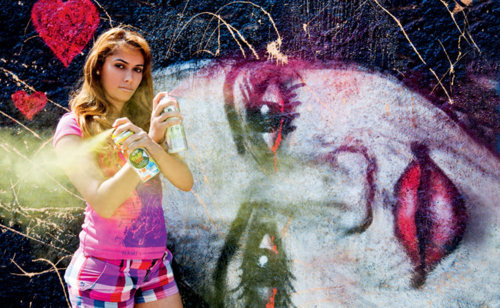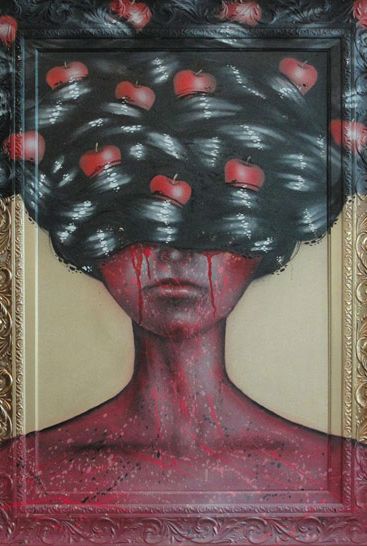 |
| Movie poster for Carousel |
I loved this film. When I was 13 or so.
Re-watching it this week—for the purpose of writing about how much I admired the way it handled domestic violence issues (in 1956, no less)—I realized my 13-year-old self understood jack shit about misogyny in film, and she certainly didn’t understand what constitutes successfully raising awareness about violence against women.
The only thing I can think to say about Carousel now, as a 34-year-old woman who’s been both a witness to and a victim of physical abuse at the hands of men, isn’t just that I’m appalled by its sexism or the blasé nature in which it deals with physical abuse (I am), but that I’m seriously freaked out by how a movie musical from sixty years ago manages to feel like a fairytale screen adaptation of the 2012 Republican anti-woman agenda.
A film written, directed, and produced in 1956 will obviously echo the cultural climate of the 1950s, and during that time, rigid gender roles permeated; primarily, men were the breadwinners, and women were the homemakers. And advertisements like this existed:
Women can work outside the home now without the universe exploding (thanks, bros!), but that doesn’t mean we don’t still regularly deal with nonsense I mean gang rape fantasy advertisements like this:
We’ve come a long way, baby? I don’t fucking think so. But I’ll get back to that.
First of all, the plot: Billy Bigelow is a barker (a person who tries to attract patrons) at a carousel, and all the ladies love him, including Mrs. Mullin, the carousel owner. Billy catches the eye of the young, pretty Julie Jordan and helps her onto the carousel like she’s a child, and then stands next to her the whole time, staring at her like a fucking serial killer. The jealous Mrs. Mullin kicks out Julie and her friend Carrie, and when Julie argues about being treated unfairly, Mrs. Mullin slut-shames her for a supposed indiscretion with Billy. The indiscretion? Julie let Billy put his arm around her waist. Floozy!
 |
| Billy and Julie in Carousel |
Billy appears out of nowhere to defend Julie, and as a result, Mrs. Mullin fires him. In one of the most offensive moments in the film, Billy smacks Mrs. Mullin on the ass and says, “Go on, then, git,” as if she were an animal.
Carrie decides to go home (they have a curfew because apparently being a woman and being a child are the same thing in 1956), but Julie refuses—even though she knows it’ll mean getting fired from her job as a mill worker—because she wants to spend time with this older man whom she knows nothing about, except that he wants to bum money from her; that he’s a womanizer; and that he keeps asking “aren’t you scared of me?” like he’s offended that she isn’t. (Man up, Bigelow!)
This is a movie musical, though, so within the next five seconds Julie and Billy sing a song about love. I’m not going to pretend I don’t love this song.
They get married. Billy can’t (or won’t) find work, so they live off Julie’s aunt. Billy—because he’s so distraught and self-loathing about his inability to find employment—physically abuses Julie (off-screen), but he admits he did it because “we would argue, and she’d be right.” Well then!
Billy basically ignores her for the entire rest of the film in favor of hanging out with his criminal friend Jigger (WTF) until Julie tells Billy she’s pregnant, at which point he caresses her arms and stomach as he helps her walk up like five steps because oh my god delicate flower carrying his spawn.
I laughed in horror at the spawn-song soliloquy that follows; it perfectly encapsulates the creepy gender constraints of 2012 I mean 1956:
“His mother can teach him the way to behave, but she won’t make a sissy out of him. Not him! Not my boy! Not Bill! Bill … my boy Bill; I will see that he’s named after me, I will. My boy, Bill! He’ll be tall and tough as a tree, will Bill!”
The song continues in the same ridiculous fashion, with Billy listing off all the shit His Boy Bill might do when he gets older (e.g. hammering spikes, ferrying a boat, hauling a scow along a canal, becoming a heavyweight champ, or, if that doesn’t work out, maybe becoming the President of the United States, duh). But then, Billy’s all—“Wait a minute! Could it be? What the hell! What if he is a girl?” Actual lyrics.
Let the horror get more horrifying.
Listen. “You can have fun with a son, but you gotta be a father to a girl.” Got it? And this girl, she’ll have ribbons in her hair, and she’ll be pink and white as peaches and cream! We don’t experience the pleasure of hearing about what Peaches and Cream Girl will do with her life, but we definitely get an earful about 1) her looks and 2) all the things Daddy needs to do before her arrival. Suddenly—at the mere prospect of raising a girl child instead of a boy child—Daddy goes all Male Provider on our asses.
Let me not forget to mention this end of the song creep-out moment: “Dozens of boys pursue her. Many a likely lad does what he can to woo her from her faithful dad. She has a few pink and white young fellers of two or three, but my little girl gets hungry every night, and she comes home to me!” What is this—a song from one of those 100% unacceptable for obvious reasons father-daughter purity balls? (That lovely little tradition started as recently as 1998, by the way.)
In the end, Billy dies by falling on his own knife (seriously, fail) when he and Jigger try to steal money from a rich dude. After his death, he passes on to some makeshift Heaven-type situation where he polishes fake plastic stars for all of eternity, and for some reason, the owners of Heaven allow him to return to Earth for a day in order to help Julie and his daughter feel less horrible about him having been an overall shitty husband and criminal. Yay.
By this point, his daughter Louise is fifteen years old. Upon his return to Earth, Billy finds Louise dancing on the beach and, after he realizes everyone keeps making fun of her because of his robbery attempt, he tries to cheer her up—by giving her one of the fake plastic stars he stole (ha ha ha theft again) from Heaven.
But Louise refuses to take it! Because who the fuck is this dude!
And what does she get for refusing a gift from a random man who showed up out of nowhere? A slap on the hand. Literally. The same man who physically abused his wife when he was alive somehow walks out of Heaven and slaps the shit out of his daughter within the first ten minutes of meeting her for the first time. That isn’t even the worst of it.
The worst of it?
She runs inside to tell her mother that a strange man on the beach slapped her—but—but—it didn’t feel like a slap, she says; it felt like a kiss.
Awwwww, that’s sweet, right? Nope! Not for a fucking second. Let me tell you why.
I started this piece by talking about how my thirteen-year-old girl self remembered Carousel as a happy musical that shed light on a bad man who hit his wife. I remembered, too, that he died, but I remembered it as a punishment of sorts, a repercussion caused by living life as an abusive dickface who treated women like absolute shit. I didn’t care about his death. His death felt like a consequence of bad behavior to me, and in a way, it is—stealing money from someone at knifepoint is probably wrong, for the most part, heh. But the ultimate message of Carousel (that I somehow glommed onto as a teenager) isn’t saying to men: “Don’t abuse women, or else.” It’s saying something closer to: “SEE WHAT HAPPENS IF YOU DON’T MAN UP AND SUPPORT YOUR WOMEN, YOU LAZY BUMS?”
It’s a cautionary tale about the dangers of “failing” as a man. It’s oh-so-1956. It’s oh-so-2012.
We’re living in an age in which women’s basic rights—specifically the right to bodily autonomy, including safe and legal access to abortion—keep coming under fire by conservative Republicans and unfortunately aren’t more than half-assedly defended by supposed “progressive” Democrats, either. Further, the arguments against abortion and reproductive rights center around this lie that it’s all about Stopping the Murder of Innocent, Yet-To-Be Born Infants.
Bullshit.
The abortion debate (and now the access to birth control debate—for fuck’s sake!) exists because we live in a culture that time warped to, or possibly never actually left, 1956. Women are still fighting for basic human rights—in 2012—because power-hungry, neo-conservative bullies can’t stop jerking off to the fantasy of living out the rest of their lives in Carousel-Land.
That’s why re-watching this harmless little musical made me absolutely cringe.
It’s a film with dizzying dance sequences and well-known musical numbers to be sure, but it’s also a film in which women are valued and treated with respect only while pregnant, and who are otherwise disregarded, objectified, slut-shamed, abused, or infantilized, and who are expected to accept the actions of the men around them without judgment, regardless of the harm those actions may cause. And there you have it, readers: the 2012 G.O.P. Platform.
Now let’s all cry together:











